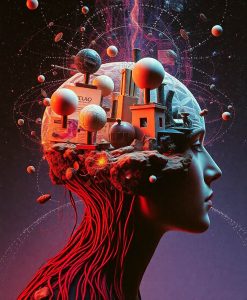—
Feeling the Flow of Your Inner World: How Our Bodies Connect to the Stream of Consciousness
When you sit quietly and tune into your body, you might notice that your thoughts and feelings aren’t just happening in your mind—they ripple through you like waves in a calm lake. The sensation of your breath, the gentle pounding of your heartbeat, or the tingling of your fingertips all serve as gateways to understanding how your inner experience unfolds over time. It’s as if your body acts as a living map, guiding you through the continuous flow of your consciousness.
Our subjective experience—the rich, personal story we tell ourselves about the world—is deeply rooted in these bodily sensations. It’s easy to forget, but the sensations we feel aren’t just passive background noise; they are integral to how our brains interpret and construct the reality we experience moment by moment. Recent scientific insights suggest that parts of our brain responsible for integrating sensory information—like the inferior parietal lobule and posterior medial cortex—are working in harmony with the ongoing rhythm of our bodily sensations to create this seamless flow of consciousness.
Think of your brain as a vivid tapestry woven from threads of sensory input, memories, expectations, and motivations. This weaving isn’t static; it’s constantly shifting, synchronizing, and reconfiguring itself. When certain brain regions synchronize differently between people, it hints at how each of us uniquely interprets the world—how our internal landscape colors what we see, hear, and feel. The neural synchrony reflects this dynamic process, where every sensation is infused with personal meaning, shaped by a lifetime of experiences stored in your body and mind.
Feeling your heartbeat during a quiet moment might seem simple, but it is a window into this complex dance of neural activity. Your sense of presence—the feeling that you are “here”—depends on how your brain integrates sensory signals with your memories and expectations. This integration is what makes your experience of the world feel so personal, so uniquely yours. When you’re lost in thought or immersed in a story, your brain’s synchrony patterns shift, reflecting how past memories and future hopes color your current perception.

Understanding how our bodies and brain regions work together to produce the stream of consciousness can deepen our appreciation for the richness of our subjective experience. It’s not just about what we see or hear, but how those sensory inputs are woven into the fabric of our inner world, influenced by who we are and what we carry within us. Recognizing this interconnectedness can help us become more attuned to our own inner rhythms, fostering a greater sense of presence and well-being.
By tuning into the bodily sensations that accompany our thoughts and feelings, we open a pathway to understanding ourselves more fully. This approach invites us to experience the flow of consciousness as a living, breathing process—one that is uniquely tailored to each person’s body and mind. As we learn to listen more closely to the subtle signals of our bodies, we can begin to see how our subjective experience is a deeply embodied phenomenon, continuously shaped by the harmony of neural synchrony and bodily awareness.
Learn More: Synchrony and subjective experience: the neural correlates of the stream of consciousness
Abstract: Human subjectivity, our first-person conscious experience of the world, is among the deepest scientific mysteries. This opinion article lays out an approach to examining the neural correlates of subjectivity as it unfolds over time. Subjective experience is inherently idiosyncratic, arising from effortless interpretations that feel like perceived facts (p-interpretations), and integrative, with past and expected future moments influencing the current experience. Differential synchrony effects (i.e., neural synchrony that differs between groups) suggest that parts of gestalt cortex (inferior parietal lobule and posterior temporal cortex) and posterior medial cortex track p-interpretations. Differential synchrony may result from each person’s preexisting idiosyncratic non-sensory representations (e.g., expectations, memories, motivations) being integrated with sensory inputs to yield unique meaning-infused immediate experiences across the stream of consciousness.


